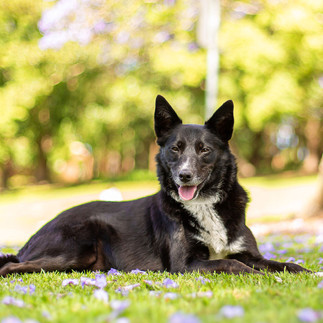When looking at Ryley, a gorgeous Border Collie cross Kelpie, you would think she was just a normal, happy dog with boundless energy and a zest for life.
Allira Photography
However, when her owner, Sharon, noticed a few lumps on her neck during snuggle time, the prognosis wasn’t good.
“We took her to our local vet and never thought it was anything serious, as she never seemed unwell,” recalls Sharon. “We were amazed when our vet said it was lymphoma and that her life expectancy was weeks to months.”
Lymphoma is a common and aggressive cancer diagnosed in dogs, and the cause is not known. Symptoms can include swellings (enlarged lymph nodes), lethargy, weight loss and loss of appetite.
“There’s no cure for B cell lymphoma at the moment,” says Dr Roger Aston, executive chairman of PharmAust, a pharmaceutical company working on an anti-cancer drug to treat B-cell lymphoma in dogs. “Usually only 50 per cent of dogs with B cell lymphoma will survive without treatment for around 30 days and the other half will mostly have severe progressive disease.”
Currently, the best indicated treatment option for canine lymphoma is chemotherapy, which comes with its own set of limitations and adverse events, such as vomiting, diarrhoea or loss of appetite, and decrease in blood cell counts. Relapses of the disease can occur within six to 12 months of treatment.
However, an alternative treatment may soon become available, with PharmAust recruiting pet dogs with untreated B cell lymphoma to finalise evaluation of a promising, newly formulated anti-cancer drug.
The drug is already approved for veterinary use for a different indication and species, and PharmAust is aiming to repurpose this drug as a safe and effective cancer treatment.
Twenty-seven pet dogs, including Ryley, have been recruited to use the novel therapy.
“We felt chemotherapy was not an option, as life expectancy is still not much more than a year,” says Sharon. “We didn’t want to put her through anything drastic, which would make her more unwell and affect her quality of life.
“I am a nurse with some experience in clinical trials, so I had a bit of an idea of what I thought would be a suitable trial. This trial guaranteed that she would be on the medication, not a placebo, and it didn’t involve an excessive number of invasive investigations and clinic visits.”
Of the 16 pet dogs with optimum blood levels, 13 have achieved stable target lesions. This includes one dog with a partial response (60 per cent regression). Nine of the 16 dogs with optimum blood levels have achieved stable disease by RECIST (Response Evaluation Criteria in Solid Tumours) and side effects were minimal or not detected.
Ryley lived for 196 days since the start of her treatment on PharmAust’s anti-cancer drug trial, which is the longest any dog has survived on the drug.
“Our main aim was to hopefully extend her life but, more importantly, maintain her quality of life,” says Sharon. “We are grateful for the extra time we could spend with her.”
Following early Phase 2 success - with dogs like Ryley - in Australia and to prepare for a trial to formally register the new anti-cancer drug in pet dogs, PharmAust is now also conducting the clinical trial in New Zealand and, more recently, the United States.
To participate in the Phase 2b trial, dogs can have any stage of lymphoma but must be feeling generally well. Ultimately, the patient will only be given the treatment if they have B cell lymphoma, but immunophenotyping (analysis of whether the cancer is a B cell or T cell
type) is covered as part of the initial screening.
The dog entry criteria for the new clinical trial program are:
any stage of lymphoma (based on physical exam)
substage A (feeling well)
dogs of any sex and at least one year of age
immunophenotype can be pending but must be submitted, and needs to be B-cell to confirm enrolment
no previous treatment in the previous 8 weeks, including corticosteroids (prednisolone)
no other significant concurrent medical problems
good quality of life
the dog should weigh more than 11 kilograms.
The trial involves consultations/treatments at the dog’s nearest trial centre, which currently includes five sites in Australia, one site in New Zealand and one site in the United States.
In New Zealand, the trial runs at the Veterinary Specialists Aotearoa in Sylvia Park, Auckland.
Owners will have to transport their dogs to their respective centre and pay the cost for initial consultation for diagnosis. Once the pet is diagnosed with lymphoma, PharmAust will cover
all clinical trial costs, including travel expenses to and from the trial centre as well as post-trial maintenance treatment if both pet owners and vets consider this might be beneficial.
The tablets will be administered at home and owners will be asked to keep a simple logbook during the trial period.
“It was easy to give her two tablets a day and fortunately we lived quite close to the [trial centre] so it was easy to take her for the visits,” says Sharon.
“If you notice a lump in your dog, take them to the vet immediately. Get it diagnosed early. Be aware of this trial, discuss it with your vet and get a second opinion with an oncologist … it’s not a cure but it gives them the best life possible.”
Canine Lymphoma Awareness
November is Canine Lymphoma Awareness Month, which is the perfect time for you to check your dog for any lumps on and under their skin.
Close to 50 per cent of dogs over the age of 10 will develop cancer and approximately one in four dogs will at some stage in their life develop cancer, according to the Vet Cancer Society.
Make sure to regularly inspect your pet for any lumps or bumps and pay attention to sudden changes in appearance and behaviour which can help with early detection.













Comments